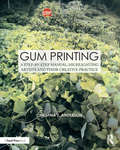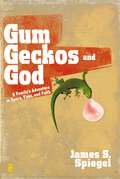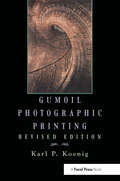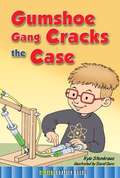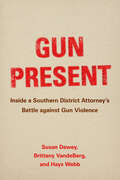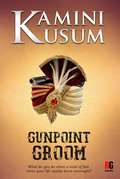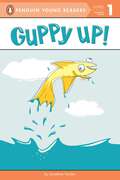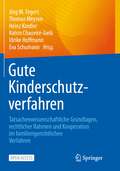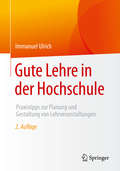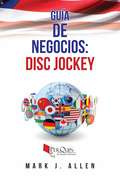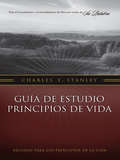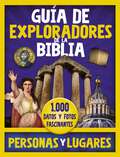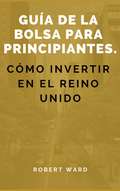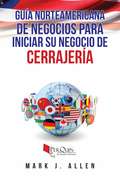- Table View
- List View
Gum Printing: A Step-by-Step Manual, Highlighting Artists and Their Creative Practice (Contemporary Practices in Alternative Process Photography)
by Christina Z AndersonGum Printing: A Step-by-Step Manual Highlighting Artists and Their Creative Practice is a two-part book on gum bichromate written by the medium’s leading expert, Christina Z. Anderson. Section One provides a step-by-step description of the gum printing process. From setting up the "dimroom" (no darkroom required!) to evaluating finished prints, it walks the reader through everything that is needed to establish a firm gum practice with the simplest of setups at home. Section Two showcases contemporary artists’ works, illustrating the myriad ways gum is conceptualized and practiced today. The works in these pages range from monochrome to colorful and from subtle to bold, representing a variety of genres, including still lifes, portraits, nudes, landscapes, urbanscapes and more. Featuring over 80 artists and 400 full-color images, Gum Printing is the most complete overview of this dynamic and expressive medium that has yet appeared in print. Key topics covered include: The history of gum Simple digital negatives for gum, platinum, and cyanotype Preparing supplies Making monochrome, duotone, tricolor, and quadcolor gum prints Printing gum over cyanotype Printing gum over platinum Troubleshooting gum Advice on developing a creative practice
Gum on a Cat
by Barbara W. MakarA systematic, phonics-based early reading program that includes: the most practice for every skill, decodable readers for every skill, and reinforcement materials--help struggling students succeed in the regular classroom
Gum, Geckos, and God: A Family’s Adventure in Space, Time, and Faith
by James S. SpiegelJames Spiegel never realized what challenges and adventures he would face in talking about God with his own children. In a book that is witty, warm, and profound, he explains complex issues of the Christian faith in terms that his children can understand and accept.
Gumoil Photographic Printing, Revised Edition
by Karl KoenigThere is renewed interest among art photographers in a number of historic printing techniques because of the remarkable effects they produce. The reader will discover how to create beautifully tinted mono- and polychromatic gum and oil images using the author's version of this 19th century technique. Step-by-step illustrated instructions with directions for further experimentation provide a perfect source for learning this new, yet old, printing technique. Gumoil printing involves contact-printing a positive transparency onto gum-coated paper. Oil paint is then applied and rubbed into nongummed areas of the print. With bleach etching, mono- and polychromatic variations are possible. A chapter on digital printing combines the new and the historic, making this technique even more accessible for the art photographer.
Gumshoe Gang Cracks The Case (Rourke's Mystery Chapter)
by Kyla SteinkrausIn Gumshoe Gang Cracks the Case, readers will help discover who destroyed Alex's science project before the Science Fair happens. Rourke's Mystery Chapter Books introduce intermediate students to the genre of mystery. Each 64-page title offers a different mystery that students solve through clues about the setting and characters. With longer text, few illustrations, and a more complex story structure, students strengthen reading comprehension skills all while having fun.
Gun Present: Inside a Southern District Attorney's Battle against Gun Violence
by Susan DeweyGun Present takes us inside the everyday operations of the law at a courthouse in the Deep South. Illuminating the challenges accompanying the prosecution of criminal cases involving guns, the three coauthors—an anthropologist, a geographer, and a district attorney—present a deeply human portrait of prosecutors’ work. Built on an immersive, community-based participatory partnership between researchers and criminal justice professionals, Gun Present chronicles how a justice assemblage comprising institutional structures and practices, relationships and roles, and individual moral and emotional worlds informs the day-to-day administration of justice. Weaving together in-depth interviews, quantitative analysis of more than a thousand criminal cases, analysis of trial transcripts, and over a year of ethnographic observations, Gun Present provides a model for scholar-practitioner collaborations.
Gunpoint Groom
by Kamini KusumWhat do you do when a twist of fate turns your life upside down overnight? All you hoped for turns into a bizarre caricature. Your own plans start mocking at you. Karan's perfect life and perfect romance come crashing when he gets kidnapped and is forced to marry a stranger. His fate is decided at gunpoint. A saga of drama and introspection starts soon after leading to a transformational journey into self-discovery. It is no less a drama for Kavya, the forced bride. Gunpoint groom explores the murky world of groom kidnapping and what takes place in the families that go through it. There's love, romance, sex, sadness and twist in the novel which explores a culture clash of ideas and traditions that modern India is. The subject of inter-state migration, tradition, politics and freewill makes a heady cocktail until everything starts falling in place in the lives of the protagonists. A fast-paced page-turner, gunpoint groom will take you on a rollercoaster ride which you may not want to get off from.
Guppy Up! (Penguin Young Readers, Level 1)
by Jonathan FenskeThis guppy is not your average fish. This guppy shops, mops, drives, and plays the drums...just to name a few! With playful, rhyming text and bright, bold, guppy graphics, this Level 1 reader is an exceptionally fun choice for both children and educators.
Gus the Gulping Goat: Targeting the g Sound (Speech Bubbles 1)
by Melissa PalmerGus loves to gulp yoghurt, but he is not the only one. Has he met his match? This picture book targets the /g/ sound, and is part of Speech Bubbles 1, a series of picture books that target specific speech sounds within the story. The series can be used for children receiving speech therapy, for children who have a speech sound delay/disorder, or simply as an activity for children’s speech sound development and/or phonological awareness. They are ideal for use by parents, teachers or caregivers. Bright pictures and a fun story create an engaging activity perfect for sound awareness. Please see other titles in the series for stories targeting other speech sounds.
Gussie & Max: A Sweet Story of First Friendships
by Deirdre SullivanAn original and touching story of a little koala and monkey, the best of friends.Where are you going and where have you been?Gussie the Monkey and Max the Koala take us on a trip through the years of their friendship and accomplishments.They remember standing on tip toes, needing help to build block towers, imaginary friends, and how hard it was to say goodbye.As they anticipate new experiences like riding the school bus, learning addition and subtraction, and riding two-wheel bikes, they support one another in their journey of growing up and learning new things.This book instills confidence, honors the value of friendships, and reassures little ones how to ease into new experiences in a hopeful, loving manner.
Gute Kinderschutzverfahren: Tatsachenwissenschaftliche Grundlagen, rechtlicher Rahmen und Kooperation im familiengerichtlichen Verfahren
by Heinz Kindler Jörg M. Fegert Ulrike Hoffmann Thomas Meysen Katrin Chauviré-Geib Eva SchumannIn Kinderschutzfällen ist es Aufgabe der Jugendämter und Familiengerichte, im Raum stehende Kindeswohlgefährdungen einzuschätzen und gegebenenfalls durch geeignete Hilfen und Maßnahmen abzuwenden. Diese Einschätzungen und Entscheidungen können den weiteren Lebensweg von Kindern und ihren Eltern stark beeinträchtigen. Umso wichtiger ist es, dass die an familiengerichtlichen Kinderschutzverfahren beteiligten professionellen Akteure sich über ihre eigenen Aufgaben und die der anderen im Klaren sind, damit sie gut zusammenarbeiten können.Das vorliegende Buch vermittelt Grundlagenwissen aus verschiedenen Disziplinen und bietet damit das Fundament für eine gute interdisziplinäre Zusammenarbeit. Es enthält tatsachenwissenschaftliche Erkenntnisse zu Kindeswohlgefährdungen und deren Abwendung Grundlagenwissen zur kindlichen EntwicklungOrientierung zu den beteiligten Akteuren, Vernetzung und Interdisziplinarität Kenntnisse über die rechtlichen Rahmenbedingungen Grundzüge zum Ablauf von KinderschutzverfahrenDie Publikation orientiert sich am interdisziplinären Online-Kurs „Gute Kinderschutzverfahren“ (https://guteverfahren.elearning-kinderschutz.de/) und bietet allen juristischen, sozialpädagogischen, psychologischen und medizinischen Fachkräften die für qualifizierte Kinderschutzverfahren benötigten vertieften Grundlagenkenntnisse. Es handelt sich um eine Open-Access-Publikation mit freiem und uneingeschränktem Zugang zur elektronischen Ausgabe.
Gute Lehre in der Hochschule: Praxistipps zur Planung und Gestaltung von Lehrveranstaltungen
by Immanuel UlrichWie plane ich meine Lehrveranstaltung? Wodurch kann ich Studierende begeistern? Wie präsentiere ich mich? Wie will ich lehren? Wie prüfe ich korrekt? Welche Lehrmethoden gibt es?Solche und viele andere Fragen müssen sich Lehrende mangels flächendeckender (hochschul-)didaktischer Ausbildung viel zu häufig selbst beantworten. Dieses Buch soll dem entgegenwirken und präsentiert auf Basis des aktuellen Forschungsstandes praktische Tipps zu guter Hochschullehre für alle Fachrichtungen.Für die zweite Auflage wurde das Buch komplett aktualisiert und inhaltlich erweitert. Hierzu wurden neue Forschungsergebnisse in alle Kapitel integriert und neue Kapitel geschrieben.
Guys and Ghouls (Ghostville Elementary #13)
by Debbie Dadey Marcia Thornton JonesIt's a boys-versus-girls battle! Big bully Andrew is determined to prove that boys are better than girls -- after all, boys are cool and totally rule. But Cassidy and Nina know that he's wrong, since girls smell sweet and can't be beat. But when classroom ghosts join the competition, the rest of the school realizes that something's not right. A ghost fight? Not that scary! The competition is on -- may the best ghoul win!
Guía Para Principiantes En Ecolocalización
by Timothy Johnson Gloria Cifuentes Dowling¿Es usted una persona ciega? ¿No lo es? En ambos casos puede aprender a "ver" usando sonidos en lugar de la vista. La ecolocalización es una habilidad sencilla que muchas personas ciegas utilizan a diario para desplazarse y comprender su entorno. En ocasiones puede ser mal interpretada, pero resulta mucho más realista y fácil de implementar de lo que se piensa. El autor desmitifica la creciente práctica de la ecolocalización activa a un nivel que cualquiera puede entender y ofrece al lector ejercicios, ejemplos y enseñanzas simples para que se inicie en una aplicación exitosa de esta habilidad. Las ondas sonoras, como el oleaje en un estanque, se reflejan de distinta manera en los objetos y superficies. Esto hace posible que un oído entrenado distinga la forma, el tamaño, la distancia y el material de los objetos a su alrededor. El músico nos dirá que la "reverberación" permite que cada recinto o superficie genere su propia respuesta sonora específica. Por medio de la sensibilización y de la práctica aplicada de esta habilidad, es posible que los discapacitados visuales de todo el mundo se vuelvan cada vez más independientes, complementando su manera actual de orientarse y de desplazarse con la percepción personal obtenida por medio de la ecolocalización. Para esto no se requiere ningún equipamiento especial ni talento específico. El cuerpo y la mente son verdaderas maravillas de la naturaleza que nos ofrecen capacidades insospechadas. Si podemos escuchar, podemos ecolocalizar. Comprender la simpleza de esta habilidad nos hará cambiar nuestra manera de pensar para dar lugar a una percepción enriquecida del entorno. Gracias a este nuevo nivel de conciencia llegaremos a ser más independientes y seguros y contaremos con nuevas posibilidades y oportunidades.
Guía de Consejos de Diseño Artístico de Letras para el Aprendizaje de Caligrafía
by Betty Longsdale Carola Sánchez CuevaEn un tiempo en el que mucho de lo que escribimos está hecho a través de fuentes de computadora, el diseño artístico de letras nos permite ser únicos y expresar nuestro propio estilo. En este libro, Maggie revela la belleza del arte y cómo tú puedes dominar esta forma de arte para expresarte a ti mismo. Aquí está lo que se incluye: -Material necesario -Plumillas -Tinta -Papel -Preparación -Curvas y trazos -Diferentes estilos --> Deslízate al principio de la página y haz click en Añadir al carro para comprarlo instantáneamente Descargo de responsabilidad: Este autor y los propietarios de Copyright no afirman, prometen, o garantizan exactitud, completitud, o adecuación de los contenidos de este libro, y expresamente niegan toda responsabilidad por los errores y omisiones en los contenidos dentro de este. Este producto es solo para uso referencial.
Guía de Estudio Bíblico del Libro Génesis: Entendiendo la Palabra de Dios por
by Brian GugasEl Libro de Génesis es un libro de los comienzos--el comienzo del universo, el comienzo del pecado, el comienzo de la necesidad por la misericordia de Dios y el perdón, el comienzo de los diferentes grupos de gentes, el comienzo de el pueblo escogido de Dios, y el comienzo de la revelacion del plan develado de Dios para la humanidad. Como el nombre lo sugiere Génesis significa "en el comienzo". Este es el primer libro y cubre el viaje de la creacion, este cubre topicos como : •El desarrollo de la nacion de Israel •Isaac y Jacob •La historia de José •El diluvio y el Arca de Noé y mucho más.
Guía de Kindle Unlimited para autores y editores
by James Christiansen Marina CasasKindle Unlimited ha cambiado las reglas del juego y su impacto en autores y editores --especialmente en los autores indies y los autoeditados-- puede ser enorme. ¿Cómo te preparas para estos cambios? Esta guía te ayudará a entender los cambios para que no te quedes atrás. Los libros de Kindled Unlimited son la forma en la que la gente está consumiendo contenido ahora. El bajo precio indudablemente hace que los beneficios sean bajos, así que, ¿cómo puedes compensar eso? Esta guía Kindle Unlimited te ayudará a entender Kindle Unlimited para los autores.
Guía de Negocios: Disc Jockey
by Mark J. AllenEste guía le mostrará técnicas eficaces para crear un negocio rentable incluso durante estos tiempos con una económica incierta. Con la lectura de esta guía, usted aprenderá consejos y trucos para ayudarle a iniciar su negocio con una inversión mínima. Aprenderá a elegir correctamente la estructura legal de su empresa. También aprenderá de los errores que hacen nuevos propietarios y cómo evitarlos. Si está interesado en ganar más dinero, rápidamente, esta es la guía para usted. Además de consejos de ahorro de tiempo, ideas eficaces de mercadotecnia y secretos empresariales, también obtendrá un plan de acción de paso a paso y fácil de entender que eliminara la inseguridad habitual de iniciar un propio negocio. Empiece a ser su propio jefe y pida esta guía hoy.
Guía de Supervivencia Callejera: Técnicas de Pelea, Evasión y Alerta para la Defensa Personal
by David Arieta Galván Rory ChristensenDeshazte de las tonterías y confusión de aprender defensa personal. Este libro será tu guía de supervivencia callejera y simplificará el proceso de aprendizaje de defensa personal. Si quieres saber sobre este tema, este libro te ayudará a ello. Aquí aprenderás: *Cómo defenderte y NO ser arrestado en el proceso *Cómo evitar ser una víctima de la violencia *Cómo detectar y evitar problemas antes de que sucedan *Cómo manejar el problema cuando ya está presente *Cómo manejar la sensación de miedo y la adrenalina *Cómo lidiar con las secuelas de la violencia *Y mucho más Si justo estás comenzando tu viaje en la defensa personal, este libro te ayudará diciéndote exactamente que necesitas saber en simples y concisos términos. No son sandeces sobre defensa personal.
Guía de estudio Principios de Vida
by Charles F. StanleyCharles Stanley presenta 30 Principios de Vida que pueden ayudarle a asemejarse más a Cristo cada día. Esto se logra a través del poder del Espíritu Santo, y con su propio empeño y disciplina.En este libro, el autor Charles Stanley presenta 30 Principios de Vida que pueden ayudarle en el proceso. Aprenderá que: «la Palabra de Dios es un ancla inamovible en las tormentas», «si libra todas sus batallas de rodillas, siempre obtendrá la victoria», «Dios actúa en favor de quienes esperan en Él», y mucho más. Estos principios se ofrecen en una guía de estudio para uso individual o grupal, hay uno para cada día del mes.Poniendo en práctica estos 30 Principios de Vida, estará colaborando de lleno con el Espíritu de Dios, y su vida se asemejará a la de Cristo.
Guía de exploradores de la Biblia, personas y lugares: 1,000 Datos y fotos fascinantes
by VidaDel principal editor de la Biblia del mundo llega la Guía de exploradores de la Biblia, personas y lugares, el recurso perfecto para los niños curiosos sobre personas y lugares de la Biblia.Repleto de datos divertidos y fotos, ilustraciones y mapas a todo color, este libro da vida a personajes y lugares bíblicos clave como:• Las primeras personas: Adán y Eva• Reyes y reinas: el rey Salomón y la reina de Saba• Guerreros: Débora y Sansón• Profetas: Elías y Eliseo• El gigante y el pequeño: Goliat y David• El mundo antiguo• Jerusalén• ¡Y más!Guía de exploradores de la Biblia les fascinará a los niños de 8 años en adelante y es la referencia perfecta para lectores reacios y estudiantes visuales interesados en descubrir la historia de la Biblia y su gente.The Bible Explorer&’s Guide, People and PlacesFrom the world's leading Bible publisher comes The Bible Explorer&’s Guide, People and Places, the perfect resource for kids curious about people and places in the Bible.Packed with fun facts and full-color photos, illustrations, and maps, this book brings to life key Bible characters and places such as:The first people: Adam and EveKings and Queens: King Solomon and the Queen of ShebaWarriors: Deborah and SamsonProphets: Elijah and ElishaThe giant and the little one: Goliath and DavidThe ancient worldJerusalemAnd more!The Bible Explorer&’s Guide will fascinate children ages 8 and up andis the perfect reference for reluctant readers and visual learners interested in discovering the history of the Bible and its people.
Guía de la bolsa para principiantes. Cómo invertir en el Reino Unido
by Robert WardLibro con fines educativos sobre cómo invertir en el mercado del Reino Unido. Los contenidos tratados son los siguientes: Capítulo 1: Bolsa de valores para principiantes Capítulo 2: ¿Cómo funciona la bolsa de valores? ¿Cómo se realiza la compra-venta de acciones? Capítulo 3: ¿Qué son los índices bursátiles? Capítulo 4: Cómo comprar acciones Capítulo 5: Análisis fundamental y análisis técnico Capítulo 6: Tipos de acciones Capítulo 7: Estrategias de inversión a corto y a largo plazo Capítulo 8: Estrategias a corto plazo e inversiones activas Capítulo 9: Fondos de inversión cotizados (Exchange Traded Fund – ETF)
Guía norteamericana de negocios para iniciar su negocio de cerrajería
by Mark J. AllenEn este manual encontrará efectivas técnicas para crear un lucrativo negocio de cerrajería incluso durante estos tiempos de incertidumbre económica. Como resultado de leer esta guía, aprenderá consejos y trucos que le ayudarán a iniciar su negocio con una inversión mínima. Aprenderá a escoger de manera correcta la estructura legal de su empresa. ¡También aprenderá los errores que cometen los propietarios de nuevos negocios y cómo evitarlos! Si está interesado en ganar más dinero y rápidamente, esta es la guía para usted. Además de los consejos para ahorrar tiempo, ideas altamente eficaces de comercialización y secretos profesionales, también obtendrá un plan de acción detallado y de fácil comprensión que eliminará la normal inseguridad de iniciar su propio negocio. Decídase a ser su propio jefe y ordene hoy.
Guía para Mujeres para Recuperar a tu ex para Siempre: ¡En menos de 4 semanas!
by Sarah James¿Sientes pena o remordimiento por haberte separado de tu EX? ¿Quieres darle una segunda oportunidad a tu relación o matrimonio? Si quieres tener las mejores posibilidades de recuperar a tu ex entonces esta guía es para ti. Usamos las estrategias más probadas y un proceso paso a paso que puedes seguir para volver definitivamente con tu ex. Nuestra guía cubre lo siguiente: - Paso a paso de como volver a estar juntos. - Consejos y estrategias. - Psicología para incrementar tus chances de tener éxito. - Como actuar y que proceso realizar para reiniciar el contacto con tu ex. - ¡Y MUCHO MAS! Si quieres mejorar tu relación con tu ex y finalmente volver con él, entonces esta guía es para ti. -> Desplázate hasta la parte superior de la página y haz clic en Agregar al carrito para comprarlo ahora mismo<- Renuncia de responsabilidad: Este autor y/o el(los) propietario(s) de los derechos no hacen afirmaciones, promesas o garantías con respecto a la exactitud, integridad o adecuación de los contenidos de este libro, y se exime de toda responsabilidad.
Guía para el estudio en grupo
by Pastor David Yonggi ChoEste libro es un estudio sistemático de la Biblia dividido en unidades y lecciones semanales que facilitan tanto el estudio en grupo como individual. Cada lección concluye con sugerencias para la aplicación del mensaje de la vida diaria. En este libro se encuentran el análisis de la creación, la caída, la promesa de redención, Jesucristo el Dios-Hombre y el ministerio de Jesucristo.
